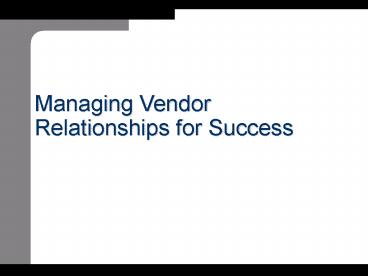Strat Plan Model PowerPoint PPT Presentation
1 / 16
Title: Strat Plan Model
1
(No Transcript)
2
Vendors, like staff, need managing
- The RFP and subsequent contract arent enough to
guarantee achievement of promised deliverables - Many IT projects have failed due to poor or
non-existent vendor management - Vendor staff need to be managed just like the
rest of us.
3
JANUARY 19, 2004 (COMPUTERWORLD) "The
relationship between corporate IT and vendors
has never been worse."
4
IT leaders were asked the following two questions
- 1. How satisfied are you with your vendors?
Very satisfied 20 Somewhat satisfied 20
Somewhat dissatisfied 50 Very dissatisfied
10 - 2. How satisfied are you with current vendor
management practices? Very satisfied 2
Somewhat satisfied 8 Somewhat dissatisfied
30 Very dissatisfied 60
5
What are the top complaints?
- Theyre always selling, never solving
- Its always about them, never about us
- They bombard us with much-too-complicated billing
and labor-intensive account-relationship
administrivia
6
More problems
- Once the contract is signed the relationship
changes dramatically - The highly-qualified consultants that helped
close the deal are suddenly unavailable - The vendor blames you or your staff for the
failure to show progress - Vendor staff bill plenty of hours but actual
progress doesnt occur
7
The solution simple project management applied
to vendors
- Make sure all vendor activities are documented in
your project plan - Make sure all vendor-supplied units of work are
broken into time segments that do not exceed an
amount of time that you can afford to
losetypically a maximum of 40 to 80 hours - Demand accounting for all project slippage
- Arrange for vendor reporting on a weekly basis
- Consider a hiring professional who specializes in
program and vendor management
8
By 2005, 70 percent of enterprises will use more
than three sources for service delivery in key
areas however, less than 10 percent will have
the resources and processes in place to manage
multiple sources for enterprise
value. (GartnerGroup, Managing
the Multisourced Environment)
9
Traditional RFPs are part of the problem
- Most RFPs dont sufficiently describe expected
deliverable(s) and leave vendors guessing as to
what you want - RFPs are a usually a poor substitute for a
complete needs analysis - The RFP process tends to reward vendors that
provide optimistic responses and lowball pricing
(and penalize those that provide more realistic
pricing and scoping)
10
Solution? Issue RFP that asks for services rather
than deliverables
- Ideal for complex, enterprise-wide projects
- Focuses on capabilities rather than a
deliverables - Allows you to compare documented skill-sets
rather than compare promised features
11
Once contract is signed use SOWs to track and
monitor deliverables
- The master contract should specify a blended rate
for different types of activities - Different activity categories might include the
following - Senior integration consultant
- Enterprise integration analyst
- Communications specialist
- Websphere developer
- Justice XML specialist
12
Conceptual tasks
- Contribute to technical architecture discussions
- Review and discuss project plans,
- Review and discuss potential integration
initiatives - Assist with procuring project deliverables
- Assist with contracting
13
Technical tasks
- Develop data exchange methods
- Bridge data exchange points
- Develop hardware configurations and
communications networks - Reconcile local data with national standards
- Devise data migration and transformation methods
- Map data elements between agency systems
14
Managing vendor tasks
- All phone calls and personal contacts should be
timed and logged - Vendors should provide detailed weekly summaries
of all activities - All work should be tracked and reconciled through
a work breakdown structure (WBS) - Performance measurement should be applied to all
vendor activities and monitored by your agency
project manager
15
Use performance-based contracting
- Performance-based contracting allows you to
withhold payment until deliverables that satisfy
your specifications are received - Performance-based contracting is valuable when
you have complete knowledge of the deliverable
and can convert your knowledge into detailed
specifications - If you dont have complete knowledge of your
requirements, be careful of what you ask for
16
In Summary
- Incorporate all vendor activities into your
project plan and insist on regular reporting - Track all vendor-supplied units of work and
demand accountability - When issuing RFPs for deliverables completely
detail all requirements, assumptions and expected
levels of service - Issue RFPs for professional services rather than
deliverables and when possible and use negotiated
SOWs for functional deliverables - Use performance-based contracting whenever
possible - Use a professional program manager for complex
projects

